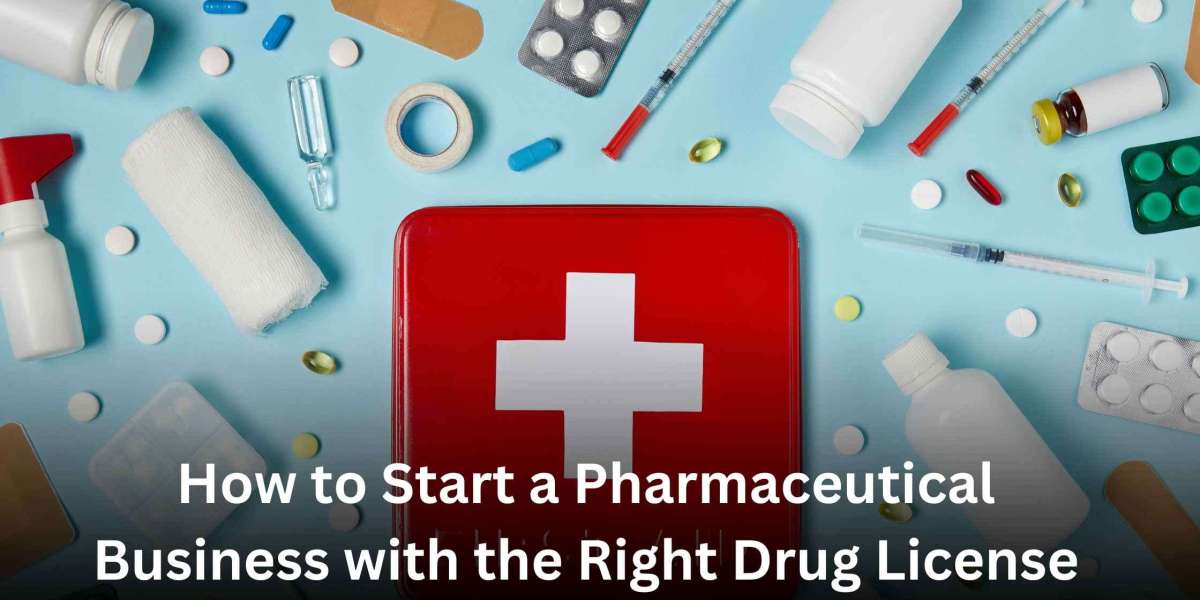Starting a pharmaceutical business can be a lucrative and impactful venture, especially in a country like India, where the healthcare and pharmaceutical industries are growing rapidly. However, one of the most crucial steps to ensuring the success and legal compliance of your business is obtaining the correct drug license. This license ensures that your business can operate legally and safely in the pharmaceutical industry, meeting all regulatory requirements set by the government.
In this blog, we will explore how to start a pharmaceutical business in India, the importance of obtaining the right drug license, and the necessary steps to follow in order to comply with the legal framework for the sale, manufacturing, and distribution of drugs.
What Is a Drug License?
A drug license in India is an official permit issued by the Drug Control Department under the Drugs and Cosmetics Act, 1940, that allows a business to legally manufacture, sell, or distribute drugs and medicines in India. It is a mandatory requirement for businesses engaged in any of the following activities:
- Pharmaceutical manufacturing: Producing and packaging medicines.
- Wholesale distribution: Supplying medicines to retailers or hospitals.
- Retail sale: Selling medicines directly to customers.
A drug license ensures that a business is complying with the standards for manufacturing, quality control, safety, and ethical practices in the pharmaceutical industry. Without it, a business cannot legally operate in this field.
Why Do You Need a Drug License?
1. Legal Requirement: Under the Drugs and Cosmetics Act, any business involved in the manufacturing, sale, or distribution of medicines must have a valid drug license to operate legally. Failing to obtain this license can lead to penalties, suspension of business operations, or even legal action.
2. Consumer Safety: A drug license ensures that the medicines being sold or distributed are safe for use. It guarantees that drugs are manufactured in approved facilities and meet quality standards.
3. Building Trust: For pharmaceutical businesses, a drug license enhances credibility. Consumers and healthcare professionals are more likely to trust a business that is licensed and follows regulatory standards.
4. Avoiding Penalties: Operating without a drug license can result in heavy fines and legal troubles. In extreme cases, it could lead to the shutdown of your business.
Types of Drug Licenses in India
Before starting your pharmaceutical business, it's important to understand the different types of drug licenses available in India. The type of license you need will depend on the nature of your business activities.
1. Retail Drug License
A retail drug license allows a business to sell medicines directly to consumers. Retail pharmacies, drug stores, and online pharmacies need this license to operate legally. This license is granted to businesses selling medicines over the counter (OTC) or prescription drugs.
2. Wholesale Drug License
If you plan to distribute medicines to retail pharmacies, hospitals, or other healthcare providers, you will need a wholesale drug license. This license is required for businesses engaged in the wholesale supply of medicines in bulk.
3. Manufacturing Drug License
If your business involves the manufacturing of pharmaceutical products, you will need a manufacturing drug license. This license is required for setting up a pharmaceutical manufacturing facility, whether for over-the-counter drugs, prescription medicines, or other related products.
4. Import/Export Drug License
If your business involves the import or export of medicines, you must obtain an import/export drug license. This license ensures that the drugs being imported or exported meet the required quality standards and are compliant with Indian laws.
5. Cosmetic License
In addition to medicines, if you plan to manufacture or sell cosmetics, you will need a separate cosmetic license to comply with regulations.
Steps to Start a Pharmaceutical Business with the Right Drug License
Starting a pharmaceutical business involves several steps, from registering your company to obtaining the necessary licenses. Here’s a simplified process for starting your pharmaceutical business in India:
1. Determine Your Business Activity
Before applying for a drug license, determine the nature of your pharmaceutical business. Are you planning to:
- Manufacture medicines?
- Retail pharmaceutical products?
- Wholesale medicines?
Knowing the type of business will help you choose the appropriate drug license.
2. Register Your Business
Start by registering your business as a legal entity. You can choose from various business structures, such as:
- Sole Proprietorship: If you plan to run the business alone.
- Partnership: If you have business partners.
- Private Limited Company: For a more formal structure with limited liability.
- Limited Liability Partnership (LLP): A hybrid model between a partnership and a private limited company.
Once you register your business, you’ll need to get a Permanent Account Number (PAN) from the Income Tax Department and Goods and Services Tax (GST) registration if applicable.
3. Obtain the Premises for Your Business
You will need a suitable location for your pharmaceutical business. If you’re setting up a retail pharmacy, ensure that your store is in a well-trafficked area and is approved for commercial use. If you plan to manufacture drugs, you’ll need to set up a pharmaceutical manufacturing facility that complies with the necessary health and safety standards.
For wholesale drug distribution, ensure your warehouse meets the necessary storage and temperature requirements.
4. Apply for Drug License
The next step is to apply for the relevant drug license with the Drugs Control Department under the Ministry of Health and Family Welfare. The license application process involves the following steps:
a. Documents Required:
- A copy of your business registration certificate (Partnership Deed, Articles of Association, etc.)
- Proof of ownership or lease agreement for your business premises.
- Qualification details of the person in charge of the business (pharmacist qualifications, etc.).
- A layout of the premises (for manufacturing or retail stores).
- Details of the responsible personnel (for example, a registered pharmacist for retail businesses).
b. Inspection:
Once you submit your application, the local Drug Control Department may carry out an inspection of your premises to ensure it meets safety, health, and infrastructure standards.
c. Fees:
There are application fees associated with obtaining a drug license. These fees may vary depending on the type of license you are applying for.
5. Compliance with GMP and Other Regulations
If you’re setting up a pharmaceutical manufacturing unit, you must comply with Good Manufacturing Practices (GMP) as per the guidelines laid out by the Central Drugs Standard Control Organization (CDSCO). These guidelines ensure that drugs are produced under hygienic conditions and meet quality standards.
Retail pharmacies and wholesale distributors must also comply with specific standards, including drug storage, labeling, and record-keeping regulations.
6. Receive the Drug License
Once your application is approved and you have met all the necessary requirements, you will receive your drug license. This license will have a validity period (usually 1 to 5 years), and you must renew it before it expires.
Renewing and Maintaining Your Drug License
It’s important to keep your drug license up to date by renewing it before its expiration. Additionally, ensure that your business continues to comply with the regulations set by the Drug Control Department, such as:
- Keeping accurate sales records.
- Ensuring that medicines are stored properly.
- Following compliance under FEMA (if applicable to your business, particularly for import/export activities).
Non-compliance with these regulations could lead to the suspension or revocation of your license.
Conclusion
Starting a pharmaceutical business in India can be a rewarding opportunity, but it comes with the responsibility of complying with regulatory requirements. A drug license is an essential component of this process, ensuring that your business operates legally and ethically. Whether you're looking to set up a retail pharmacy, a wholesale distribution business, or a pharmaceutical manufacturing unit, obtaining the right drug license is crucial for the growth and sustainability of your business.
By following the steps outlined above and ensuring that you meet all legal requirements, you can set your pharmaceutical business on the path to success while contributing to the growing healthcare sector in India.








